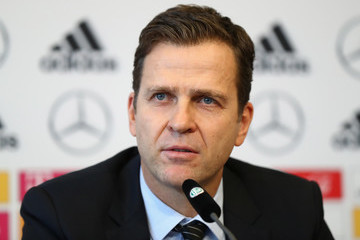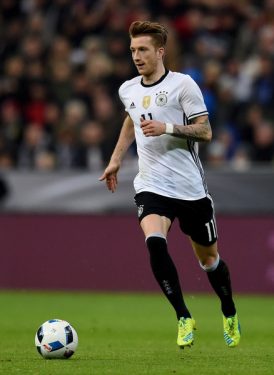1994 is not a year that generally looms large in German football’s collective consciousness, but that could change over the next few weeks. Oliver Bierhoff referenced that World Cup, a largely forgotten US campaign that culminated in an ignominious 2-1 defeat by Bulgaria in the quarter-finals.
From the national team’s perspective, it is a warning from history. “We threw that tournament away,” Germany’s sporting director recalled.
Berti Vogt’s squad had been widely hailed as even better than the 1990 World Cup winning edition at the time. In Matthias Sammer and Stefan Effenberg, they had gained a couple of superb midfielders, as well as more depth in attack, but Vogt’s over-indulgence of his players led to lack of discipline and team spirit.
1994 was a huge disappointment as well as a disgrace. Effenberg had been sent home having shown German fans the middle finger in the group game against South Korea.

This generation of players is likely to be much better behaved but Bierhoff didn’t mention 1994 without reason. The 50-year-old believes Russia constitutes “the most difficult World Cup ever” for the Germany team, since “they will be the hunted, with everyone eager to trip us up”.
Extra motivation on behalf of the opponent combined with slightly focus and willingness to work as a team would make for a very dangerous combination, the former AC Milan striker fears.
More recent experiences have taught Joachim Löw and his staff just how important a spirit of togetherness can be for a successful campaign. After dressing room tensions had done their part to derail Germany’s Euro 2012 campaign, the German FA hierarchy invested huge resources and energy into strengthening the bonds between players at the 2014 World Cup in Brazil.
Löw and Bierhoff will try to take similar measures but whether a team made up of World Cup winners and young guns eager to stake their claim will respond in the same fashion remains to be seen. Löw in particular will have his work cut out to juggle the demands of a healthy competition for places, especially in attacking midfield, with that of unity and brotherhood.

In terms of pure quality, the Germany manager has rarely had as many good players to choose from. With the exception of left-back, where Jonas Hector (1. FC Köln) is the one and only realistic contender, he has enough depth to field two starting XIs that could win in Russia.
A team largely made up from reserves did just that at the Confederations Cup last year. The weeks in the training camp in Northern Italy will be spent fine-tuning a number of different systems and formations, to make Germany more flexible and open to changes during matches.
The addition of Timo Werner (RB Leipzig) offers a hugely exciting injection of pace, the kind of which this team has not had before. Marco Reus (Dortmund) and Ilkay Gündogan (Man City) will also be two World Cup debutants eager to set the International stage alight.
Unless this Germany trip themselves up, 1994-style, it’s hard not to see them at least make the semi-finals.
By Raphael Honigstein (Twitter: @Honigstein). He is the award winning author of Das Reboot – How Germany reinvented itself and conquered the world. You can purchase the book here










Let’s hope we won’t see another middle finger incidence in Russia, especially because of their coloured players and the possible racist chants that we may have from Russian fans.